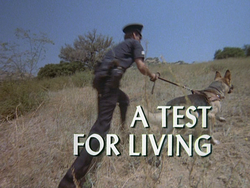A Test for the Living (Quincy, M.E.)
| A Test for the Living | ||||||||||||||||||||||||||||||||||||||
|---|---|---|---|---|---|---|---|---|---|---|---|---|---|---|---|---|---|---|---|---|---|---|---|---|---|---|---|---|---|---|---|---|---|---|---|---|---|---|

| ||||||||||||||||||||||||||||||||||||||
|
Episode Quote
“Just because a life ends doesn’t mean everything ends—sometimes it’s the start of finding the truth.” ~ Dr. Quincy
Episode Overview
A Test for the Living (S4 E3) aired October 19, 1978. Quincy investigates the death of 7‑year‑old Jimmy Reed, initially thought to be mentally impaired and deceased from natural causes. When Quincy challenges the diagnosis and champions Jimmy’s brother David, he uncovers misdiagnosis and systemic shortcomings in pediatric and psychiatric evaluation. :contentReference[oaicite:0]{index=0}
Table of Contents
Application of The QME Episode Laws
This episode thoughtfully enacts the **QME Episode Laws**:
✅ Law 1 – Uncovering Truth & Justice Quincy reveals Jimmy’s death was misclassified, and secures a re-evaluation for David—safeguarding the living brother’s welfare and justice for his family. :contentReference[oaicite:1]{index=1}
✅ Law 2 – Exploring Social & Ethical Issues It raises awareness on mental health stigma, special-needs misdiagnosis, and the ethical duty of the medical system to reassess vulnerable children—highlighting systemic failings in psychiatric care.
✅ Law 3 – Handling Controversy with Sensitivity Autism and mental disability were sensitive topics in 1978. The episode navigates these issues with empathy, respecting family and child dignity.
✅ Law 4 – Commitment to Scientific Accuracy Quincy uses neuropathology, metabolic screening, and comparative forensic review of pediatric medical records to support a scientifically valid re-examination of David’s condition.
Episode Synopsis
Jimmy Reed dies during a school field trip, and the coroner’s office attributes it to natural causes—possibly seizure. David Reed, his elder brother, exhibits behavioral concerns and is labeled mentally retarded by a psychiatrist. Quincy conducts a thorough autopsy on Jimmy and reviews David’s school and medical documents. He discerns that Jimmy may have had an undiagnosed heart arrhythmia, and that David's behavior aligns more with childhood autism than retardation.
Quincy confronts school officials and psychiatrists, advocating for David’s reassessment. Under pressure, the hospital agrees. Subsequent tests vindicate Quincy’s assessment: David is on the autism spectrum and not mentally impaired. The episode closes on hope: with proper support, David’s potential is recognized.
Plot Summary
A child’s death leads Quincy to challenge institutional labels on the living—emphasizing the importance of accurate diagnosis and compassionate medicine. The episode weaves forensic pathology with childhood neurology and ethical advocacy.
Main Cast
- Jack Klugman as Dr. R. Quincy
- Robert Ito as Sam Fujiyama
- Garry Walberg as Lt. Monahan
- Val Bisoglio as Danny Tovo
- John S. Ragin as Dr. Asten
Guest Cast
- Sam Groom as David Reed
- Tracey Gold as Jimmy Reed
- Lloyd Nolan as Dr. Albert Carlton
- Additional supporting roles: teachers, hospital staff, school psychiatrist
Case File Summary
Subject: Jimmy Reed (deceased) & David Reed (living) Key Findings: Jimmy died of undiagnosed cardiac seizures; David misdiagnosed, likely autistic Outcome: David’s reassignment and support recommended; systemic review initiated
Forensic Science Insight
- Pediatric autopsy identified subtle neuropathological indicators of seizure—attention to atypical heart pathology.
- Comparative behavioral study of David used as forensic evidence in psychiatric reclassification.
- Highlights importance of differential diagnosis and closing gaps between forensics and child psychiatry.
Themes & Tropes
- **Child Advocacy** – Quincy fights for accurate evaluation and care of vulnerable youth.
- **Medical vs Educational Institutions** – Parks systemic inertia that favors labels over understanding.
- **Science Beneath the Surface** – Unseen conditions reveal through scientific diligence.
- **Ethical Forensics** – Quincy leverages pathology for living justice as well as post-mortem.
Reception & Ratings
Praised as pioneering in spotlighting autism and mental health misdiagnoses long before public awareness. Critics noted Quincy's advocacy role as both timely and groundbreaking for a network procedural. :contentReference[oaicite:2]{index=2}
Trivia
- Tracey Gold, who plays Jimmy Reed, later gained fame on *Growing Pains*.
- Lloyd Nolan, as the hospital psychiatrist, adds gravitas to treatment debates.
- Part of a themed 1978–79 season focusing on social issues in medicine.
See Also
- Quincy, M.E.
- List of Quincy, M.E. episodes
- Autism spectrum disorder
- Pediatric forensic pathology
- Mental health in children
External Links
- [IMDb page for “A Test for the Living”](https://www.imdb.com/title/tt0681749/)
- [Rotten Tomatoes Season 4 overview](https://www.rottentomatoes.com/tv/quincy_m_e_/s04)
- [The Quincy Examiner fan archive](https://www.quincyexaminer.com)
